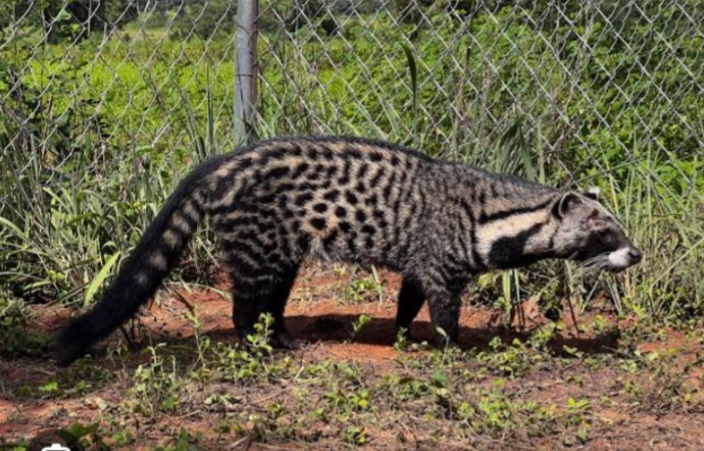Nature Life: African Civet, Nature’s Most Expensive Coffee Producers

By Obiabin Onukwugha
The African civet is a large viverrid (carnivorous mammal). Native to Africa and Asia, civets are mammals that are catlike in appearance. They are sometimes called civet cats.
There are about 15 to 20 species of civets, which belong to the family Viverridae. Civets have a long body and short legs, with a bushy tail, small ears, and a pointed snout. It is widely distributed in woodlands and secondary forests.
Civets regularly scavenge and have been reported to eat the stomach contents of dead herbivores because of the grass in them but their main diet include; carrion, rodents, birds, eggs, reptiles, frogs, crabs, insects, fruits, and other vegetation. Sometimes poultry and young lambs are also taken.
However, it is prey to most predators larger than itself, including: lions, leopards, hyena, wild dogs, snakes and crocodiles.
Civets are usually solitary and live in tree hollows, among rocks, and in similar places. It mostly comes out to forage at night. Civets have a unique way of marking their territory called “scraping.”
They use their hind feet to scrape the ground and leave behind their scent glands, signaling ownership of the area.
African Civet females are sexually active at one year old and may have two litters a year. Genital sniffing and vocalizations take place before copulation in civets. Their gestation period lasts for about 80 days.
Called “Età” in Yoruba, “edi abalị” in Igbo and “citta” in Hausa, civet can live between 15 to 20 years under favourable conditions.
The African Civet is listed as Least Concern on the IUCN Red List since 2008 though in some countries, it is threatened by hunting.
Civets play a critical role in the ecosystem, and their presence is essential for maintaining the balance of the environment. Their unique diet and behavior contribute to seed dispersal, pest control, biodiversity, and the food chain.
Civet produces a musk (named civet after the animal) which is highly valued as a fragrance and stabilizing agent for perfume production. Both male and female civets produce the strong-smelling secretion, which is produced by the civet’s perineal glands.
It is also said that the civet is known for its ability to digest coffee cherries and excrete the undigested coffee beans, which are then used to make kopi luwak, one of the most expensive coffees in the world. This unique process is said to give the coffee a distinct flavor and aroma.
However, some species of civets, like the masked palm civet, have been reported as carriers of diseases such as SARS and MERS.
In some cultures, civets are considered symbols of good luck and prosperity.
In Egyptian mythology, civets were seen as sacred animals and were associated with the goddess Bastet, who was the goddess of cats, fertility, and childbirth.
In Hinduism, civets are known as musangas or udadhi. They are believed to be the mount of the goddess of wealth, Lakshmi. Civets are also associated with the god of wealth, Kubera, who is often depicted holding a civet by its tail.
In some parts of India, people believe that sighting a civet is a sign of good luck and that it brings prosperity and wealth.
In Chinese mythology, the civet is closely associated with the moon goddess Chang’e. It is believed that the civet accompanies Chang’e during her journey across the moon, and its presence is said to bring good luck and prosperity.
In some parts of Africa and Asia, civet oil is believed to have healing properties and is used to treat a variety of ailments, from skin conditions to digestive problems.
Civets have also been associated with fertility. In some parts of Africa, it is believed that wearing a civet-skin pouch around the waist can increase a woman’s chances of conceiving.
